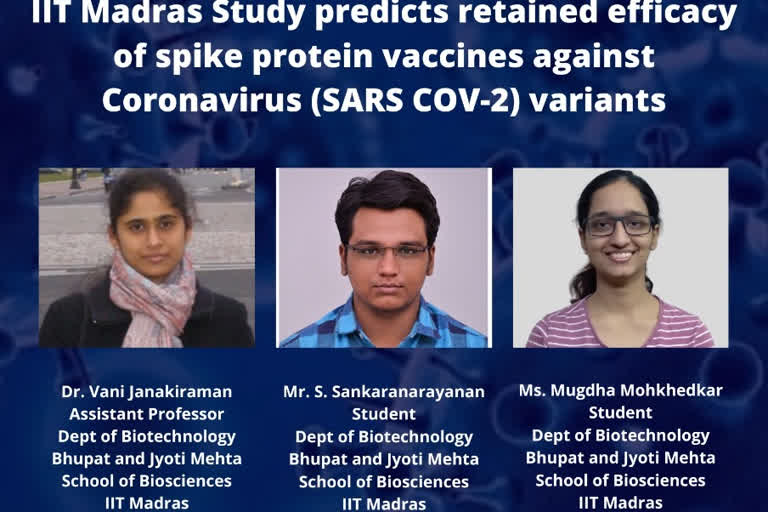Chennai: In a significant development, researchers at the Indian Institute of Technology Madras (IIT Madras) have demonstrated that spike protein vaccines may be effective against multiple variants of the Coronavirus (SARS COV-2), said a statement from the institute.
The results of the IIT Madras study suggest that the attack by selected variants – Delta plus, Gamma, Zeta, Mink and Omicron – may be dealt with by vaccine-induced T-cell responses despite the compromised neutralising antibodies responses.
The researchers analysed the molecular differences in T-cell epitopes (both CD4+ and CD8+) across a few variants – Delta plus, Gamma, Zeta, Mink and Omicron. These mutated epitope molecular structures were further analysed using immunoinformatics tools to interpret their ability to bind MHC molecules - which can help understand their ability to be recognised by/trigger T cells.
“We found that at least 90 per cent of both CD4+ and CD8+ epitopes were conserved in all the variants except Omicron, but even in Omicron, nearly 75% and 80% of CD4+ and CD8+ epitopes were conserved. Additionally, the immunoinformatics tools also predicted majorly retained ability of the epitopes to bind MHC molecules and hence trigger T cell responses. This means that the changes to the epitopes are not so large enough to evade the T-cell immune response that the body learned through vaccination,” Vani Janakiraman, Assistant Professor, Department of Biotechnology, Bhupat said.
Also read: IIT-Guwahati develops chemo strategy for cancer patients that reduces side effects
Considering that T dependent responses are a major correlate of protection via vaccination against viruses, this analysis suggested that largely conserved CD4+ and CD8+ T cell responses may lead to retained potential of the present vaccines to fight severity and fatality. Hence, even in case of reduced neutralization by antibodies, variants may not become vaccine resistant, the IIT Madras researchers said.
The IIT Madras research was led by Vani and Jyoti Mehta School of Biosciences, IIT Madras. The results of this computational study have recently been published in the reputed peer-reviewed journal BBA - Molecular Basis of Disease, in a paper co-authored by S. Sankaranarayanan and Mugdha Mohkhedkar, students from the Department of Biotechnology, IIT Madras, and Vani.
The vaccines could be considered effective against the variants if there are less mutated epitopes in their spike proteins and, if the mutated epitopes can still induce an immune response comparable to that elicited by original/native epitopes. Vani said that T-cells are an important part of the body’s immune response as they have receptors that bind to the epitope that is presented in conjunction with a large molecule called MHC on the surface of the infected cell. This triggers the immune response, either afresh or through vaccination memory, she added.
While further experimental verification is awaited, the researchers believe that the present spike protein vaccinations are likely to be efficacious against circulating variants of Coronavirus (SARS COV-2).



